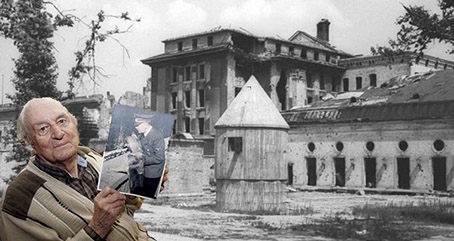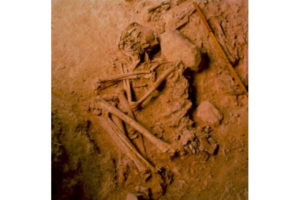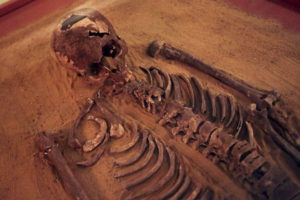On 30 April 1945, Adolf Hitler took his own life in the Reich chancellery bunker in Berlin, with Soviet troops only a block or so away. Today, the last person still alive who was in the bunker is 95-year-old Rochus Misch, who has provided one of the most interesting accounts of those last few hours.
The most complete interview with Misch was published in Salon magazine in February 2005, from where the following extracts have been lifted.

I was standing in the hallway when Hitler took his own life.
Because I wanted to go over to the Reichs Chancellery for lunch [the Reichs Chancellery was connected to the Führerbunker by a tunnel], and a colleague had already taken over for me in the telephone room.
I was standing in the hallway, asking in the neighboring room if I should bring anything back with me.
The other guy said, “No, no, I have everything already,” and it was then someone called, someone … [he searches for the name] ah, it was Linge, Linge, Hitler’s butler.
He said, “I think it’s done.” He had heard it.
But of course we were always making mistakes. Our ears played tricks.
Down there in the bunker, any loud noise echoing through the concrete sounded like a gunshot.
There was so much suspense. We had been waiting, expecting it any minute, for hours. And yet we weren’t sure. Because of course, there was always the possibility of a miracle.
The miracle would have been England. If England had said, it’s not Hitler that’s our biggest enemy, rather Bolshevism, they could have rolled right by Berlin all the way to Moscow. Churchill himself said later, “We slaughtered the wrong pig.”
And after you realized Hitler was dead?
Well, there was perfect silence. We waited. We waited maybe 20 minutes.
But Linge was curious. I was curious. I still don’t remember whether it was Linge or Günsche who first opened the door to Hitler’s rooms, but one of the two. I was really curious and came forward a few steps.
Then somebody opened the second door — I still don’t know who it was, probably Linge.
And it was then, as the second door opened, I saw Hitler, dead, lying on a chair. Eva [Braun] on the couch completely clothed. In a dark dress and white, white skin. She was lying back.
So then I said to them, “I’m going to run over and report to the commanding officer.”
And they said, annoyed, “Well, come right back.”
So I told them, “Yeah, sure. I’m just saying: I’m a soldier. I have a command to carry out.” Then I was on my way over to the Reichs Chancellery, already in the passageway, but I had an uncanny feeling, very scared and uncertain, so I turned around. When I got back they already had Hitler down on the floor.
I watched them packing him up, in a blanket. Well, so it went.
Then they carried him out, and I went away finally and made the communication to the commanding officer.
A little later, one of my comrades said, “If you want, go on up outside, the boss is getting burned.” You know, just as planned.
And I said, “No, I’m not going up. You go up!” But he said, “No, I’m not going up either, I’m getting out of here.”
So neither of us went to the cremation.
Do you remember your feelings when you realized Hitler was dead?
We were expecting it. It didn’t come as a surprise. We were living in another world at that point. We had so many feelings, fear, hope — I can’t describe it.
We had habituated ourselves to the idea of the end. We had a feeling as if we were drunk. To put it bluntly, we didn’t give a damn, finally. Nothing made a hell of a lot of difference at that point.
Were you afraid of the future?
One of the guys said to me, “Maybe we’ll be shot?” I said, “Why in the world would we be shot?”
He said, “The head of the Gestapo was here. He never comes here. Why was he here? Maybe they’ll shoot all the witnesses, everyone who knows the boss is dead.”
And you know, in fact, they did shoot people. During the burning, two civilians showed up out of nowhere. There was a wall — on the other side was the Foreign Office, and people were crawling around the city everywhere, running away from the Russians at the time. And those civilians were shot by the Gestapo. They had seen too much.
However, in the end they turned out to be a couple of Poles.
Poles?
Yes, they checked their papers. They were Polish, trying to run away. How they got there, gosh, I don’t know.
Is that probable, that they were Poles?
Well, they had the passports. One of my comrades from the police commando told me. I know it’s strange, but they were Poles. [Misch is silent.]
Right. I’d like to talk a little bit about the new movie portrayal of those last days in the bunker. Have you seen “Downfall”?
Oh, yeah, I’ve seen it. [Laughs heartily.] Dramatic operetta. It’s all Americanized. All that yelling and screaming; it wasn’t like that down there in the bunker.
The reality — it was a death bunker. Everyone whispered down there. A crazy screaming scene never happened.
Hitler never yelled?
Well, at least when the generals were down there, discussing military things, they were very quiet. It’s a film, with all the freedoms of a film. It’s no documentary.
Are there factual discrepancies, so far as you know?
No, no, just everything exaggerated.
Your character in the film is portrayed seriously thinking of killing himself at the very end, after Hitler and Eva Braun are dead, but then at the last minute he decides not to shoot. Was suicide something you remember considering very seriously?
It was different than in the film. At the very end, I asked myself: Why am I here? What am I doing now that everyone is dead or gone?
But nevertheless, I was still there, one of the only ones left in the bunker, just left there to make sure that everything down in the telephone room continued to work.
And then Dr. Naumann said to me that another doctor there, Dr. Stumpfegger, would give me something to drink, or a sort of candy.
And you thought about taking some kind of medical poison like that?
I had always believed — well yeah, if it’s all over, then I have to shoot myself too. And the atmosphere … at the end, after Hitler was dead, it was so bad.
I got a call from General Busse of the 9th Army and he wanted to speak to General Krebs. So I rang through to Krebs and he didn’t pick up.
So I went to his room and I thought he was sleeping and I tried to wake him, and he fell over. Then I noticed he was dead. I got such a fright!
And sitting next to him was Burgdorf. Both of them had taken their own lives. Just before the very end. They were the last of the military, the last people responsible for the military there.
In an interview with the Sunday Telegraph in 2000, Misch answered the question of what he knew about the Holocaust this way:
To him, Hitler was not just a distant leader. He was the kind boss who joked with his staff; the film buff who loved Charlie Chaplin and watched Gone with the Wind three times. The man who always said that he was too busy for a wife and yet, Misch believes, married Eva Braun the day before their deaths so that “he took her to the grave as a married woman solely out of consideration for her parents”.
And for Misch, this dichotomy is made more extraordinary by the fact that, despite being at the heart of Hitler’s operation, he insists he never heard any talk of the mass murder of Jews.
“How could we fail to find this out — my God, we knew nearly everything that was going on — us in the inner circle — we were always there, day and night. We saw Hitler in his nightshirt! We received the dispatches and brought them to Hitler to read. He would have them under his arm and tear out a report and hand it to me and I would get rid of it in a waste-paper basket. There was never anything on this subject.”
And yet, he does not deny the Holocaust happened. “Yes, it happened, but I can’t imagine it. I can’t imagine Hitler as a murderer. It’s simply impossible. He was so friendly, nice.
“If I met him today, I’d say, ‘Mein Führer, I didn’t really get to know you that well. For five years we could look each other straight in the eye and smile and. .. all these things that have been written about, where did that all come from? I never knew you to be like that, Mein Führer.’”







